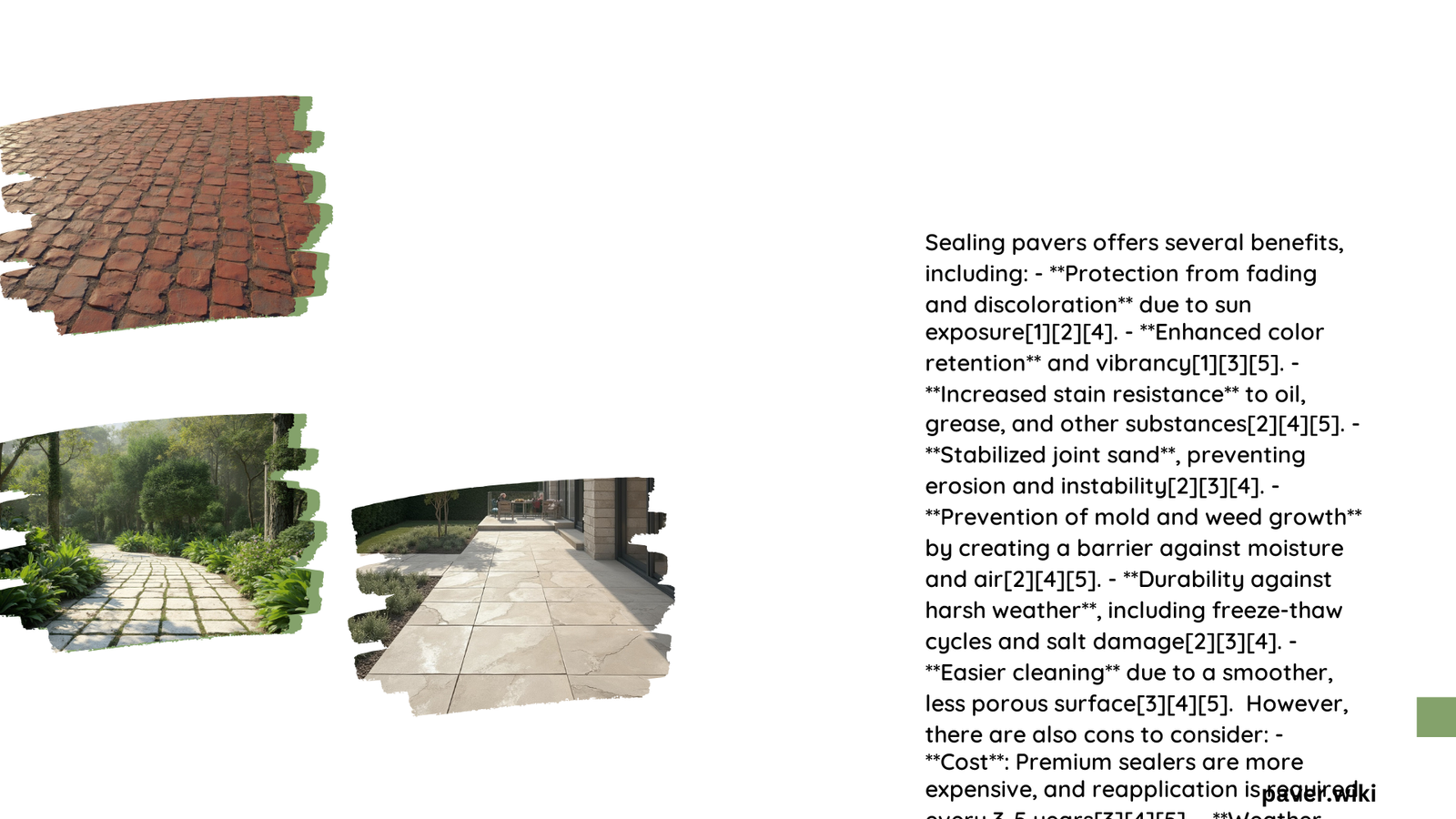Sealing pavers is a crucial decision for homeowners and contractors. It offers benefits like enhanced durability, stain resistance, and aesthetic improvements, but also comes with drawbacks such as potential slipperiness and maintenance requirements. This comprehensive guide explores the advantages and disadvantages of sealing pavers, helping you make an informed decision for your outdoor spaces.
What Are the Benefits of Sealing Pavers?
Sealing pavers provides several advantages that can significantly improve their longevity and appearance:
- Enhanced Durability:
- Protects against water damage
- Reduces fading from UV exposure
-
Prevents seasonal damage from ice and snow
-
Stain Resistance:
- Blocks up to 90% of stains from penetrating the surface
-
Prevents absorption of dirt, oil, and tree sap
-
Aesthetic Improvements:
- Enhances color vibrancy
-
Maintains original paver appearance for longer
-
Easier Maintenance:
- Simplifies cleaning process
-
Requires only soap and water for most cleaning tasks
-
Joint Sand Stabilization:
- Prevents loosening of sand between pavers
- Improves overall stability and safety
What Are the Drawbacks of Sealing Pavers?

Despite its benefits, sealing pavers also comes with some potential downsides:
- Increased Surface Slipperiness:
- High-gloss sealers can make surfaces slippery when wet
-
Requires careful selection of non-slip sealers
-
Regular Maintenance:
- Needs reapplication every 1-5 years
-
Time-consuming and potentially costly process
-
Initial and Ongoing Costs:
- Premium sealers can be expensive (around $30 per gallon)
-
Professional application adds to the overall cost
-
Weather-Dependent Application:
- Requires specific conditions for proper application
-
Needs 24-48 hours of dry weather after application
-
Potential for Appearance Issues:
- Incorrect application can lead to hazy coating or discoloration
- Over-sealing may result in an undesirable glossy finish
How Does Sealing Affect Long-term Paver Performance?
Sealing pavers can have significant long-term effects on their performance and appearance:
Wear and Tear Reduction
Sealed pavers show noticeably less degradation compared to unsealed ones:
- Reduced surface erosion
- Better resistance to freeze-thaw cycles
- Improved overall longevity
Color Retention
Studies indicate that sealed pavers maintain their color integrity better:
- Minimal fading over time
- Reduced staining and discoloration
- Enhanced overall aesthetic appeal
What Are the Cost Considerations for Sealing Pavers?
When considering sealing pavers, it’s important to factor in both initial and long-term costs:
| Cost Factor | Details |
|---|---|
| Initial Sealing | ~$30 per gallon (covers 250 sq ft) |
| Professional Application | Varies by location and project size |
| Reapplication | Every 3-5 years on average |
| Long-term Maintenance | Includes cleaning and potential repairs |
How Does Sealing Impact Property Value?
While exact figures are not available, sealing pavers can potentially increase property value:
- Enhances overall curb appeal
- Improves durability of outdoor spaces
- Reduces long-term maintenance costs
What Are the Different Types of Paver Sealers?
Choosing the right sealer is crucial for optimal results:
- Water-based Sealers:
- Easier application and cleanup
- Less odor
- Suitable for most paver types
-
May offer less UV protection
-
Solvent-based Sealers:
- Stronger UV protection
- Longer-lasting
- Can slightly darken pavers
- More challenging application and cleanup
What Are the Best Techniques for Sealing Pavers?
Proper application is key to successful paver sealing:
Application Methods
- Spray Application: Efficient for large areas
- Roller Application: Provides even coverage for smaller spaces
Optimal Conditions
- Temperature: 60-75°F (15-24°C)
- Weather: Sunny, low humidity
- Forecast: No rain for 24-48 hours after application
Common Challenges
- Surface Preparation:
- Thorough cleaning required
-
Removal of all dirt and debris
-
Avoiding Over-sealing:
- Can cause discoloration or unwanted glossiness
- Test on a small area first
Should You Seal Your Pavers?
The decision to seal pavers depends on various factors:
- Climate: More beneficial in areas with harsh weather
- Usage: High-traffic areas benefit more from sealing
- Aesthetic Preferences: Consider desired finish and color enhancement
- Maintenance Willingness: Factor in regular reapplication needs
- Budget: Consider both initial and long-term costs
Ultimately, while sealing pavers offers significant benefits in terms of durability and appearance, it’s important to weigh these against the potential drawbacks and ongoing maintenance requirements. Carefully consider your specific situation, climate, and preferences before making a decision.
